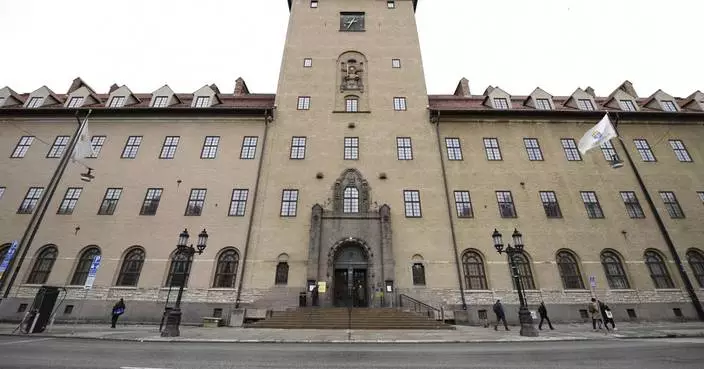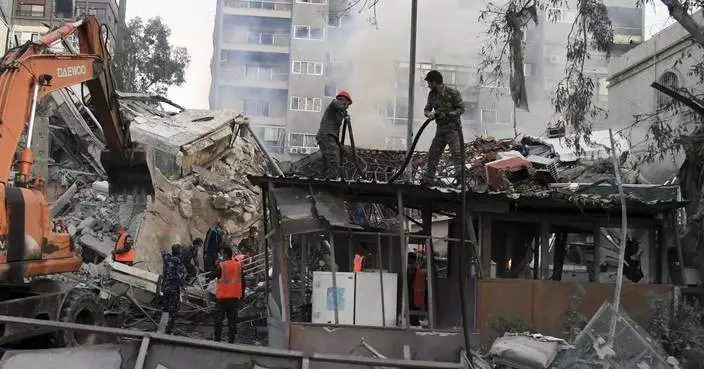The U.S. military acknowledged Thursday its troops fired on and killed a Syrian combatant when government supporters attacked an American convoy in northeastern Syria a day earlier.
The clash Wednesday was a rare direct confrontation between a Syrian pro-government group and U.S. troops deployed in the increasingly crowded terrain near the border with Iraq and Turkey.
A convoy of U.S. armored vehicles drove into a government-controlled area and was attacked by pro-government supporters, including armed men who fired at the soldiers and pelted them with stones and Molotov cocktails.
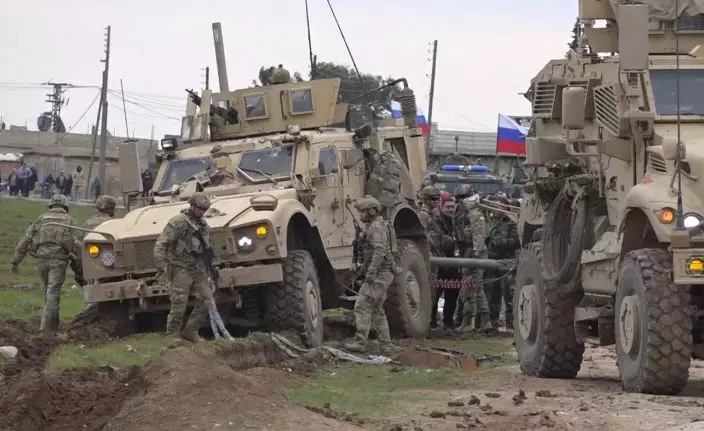
In this frame grab from video, Russian, Syrian and others gather next to an American military convoy stuck in the village of Khirbet Ammu, east of Qamishli city, Syria, Wednesday, Feb. 12, 2020. Syrian media and activists say a Syrian was killed and another wounded in a rare clash between American troops and a group of government supporters in northeast Syria. (AP Photo)
Spokesman for the U.S-led coalition Col. Myles Caggins said the person killed was a combatant. He said the U.S. soldiers had come under fire and responded in self-defense. Syrian government media maintained the person killed was a civilian.
The U.S. maintains hundreds of troops in the area as part of its fight against Islamic State group militants. In recent weeks, and following a Turkish invasion of villages and towns along its borders, the area has been swarming with Russian, Syrian government and Turkish troops. They are deployed in part to maintain the peace but also in the latest tug over territorial control in Syria's 9-year-old conflict.
Caggins said the patrol was planned, and the route passed through a pro-government area. The convoy of U.S. armored vehicles passed through a Syrian military checkpoint, but government militia were also present.
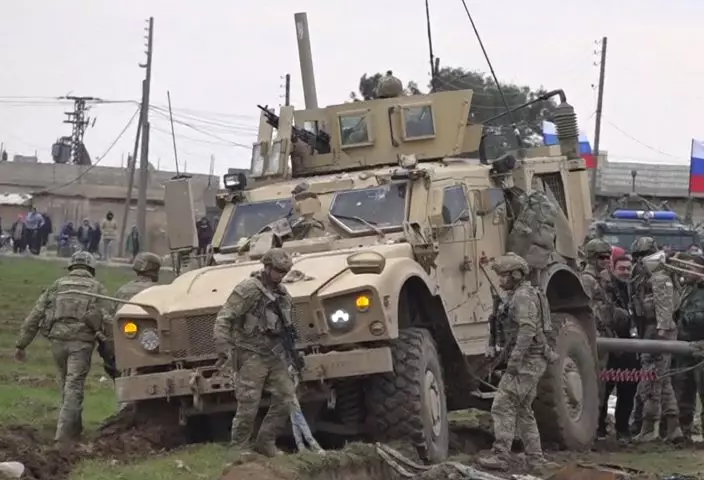
In this frame grab from video, people and soldiers gathering next to an American military convoy stuck in the village of Khirbet Ammu, east of Qamishli city, Syria, Wednesday, Feb. 12, 2020. Syrian media and activists say a Syrian was killed and another wounded in a rare clash between American troops and a group of government supporters in northeast Syria. (AP Photo)
The U.S. maintains lines of communication with Russia, Damascus's ally, to avoid such confrontations. It wasn't clear if the route was deconflicted.
Videos showed government supporters attacking the vehicles and a couple of men firing small arms at the convoy, which was flying the U.S. flag. Some residents pelted the convoy with stones, while another dumped a bucket full of dirt on the back of one vehicle.
U.S. soldiers were seen standing in the middle of the melee, trying to disperse the crowd. One U.S. vehicle was stuck in the dirt, apparently having veered into a ditch, while another had a flat tire.
“Despite U.S. troops' repeated de-escalation efforts, local militia members attacked U.S. troops with small arms weapons from multiple firing positions,” Caggins said. “Coalition forces always have the right to self-defense and fired back at armed aggressors killing one adult male combatant.”
BEIRUT (AP) — Amnesty International said Wednesday it has documented widespread abuses, including torture and deprivation of medical care, in detention facilities holding thousands of suspected Islamic State members and their relatives in northeast Syria.
The centers and camps hold about 56,000 people — the majority of them children and teens — and are run by local authorities affiliated with the U.S.-backed, Kurdish-led Syrian Democratic Forces. The SDF and its allies, including U.S.-led coalition forces, defeated the Islamic State group in Syria in 2019, ending its self-proclaimed Islamic “caliphate” that had ruled over a large swath of territory straddling Iraq and Syria.
What to do with the suspected IS fighters and their families has become an intractable issue. Many countries whose citizens traveled to Syria to join IS have been reluctant to repatriate them, as have local communities in Syria.
"People held in this system are facing large-scale violations of their rights, some of which amount to war crimes,” Nicolette Waldman, Amnesty’s senior crisis advisor, told journalists.
The United States is also responsible for the alleged violations because it played a key role in establishing and maintaining the detention system, providing hundreds of millions of dollars to the SDF and affiliated forces and regularly interrogating detainees, Waldman said.
The human rights group interviewed 126 people accused of IS affiliation currently or formerly detained, along with representatives of the local administration and aid workers.
The Amnesty report said the vast majority of detainees are being held “indefinitely, without charge or trial, in violation of international human rights law and international humanitarian law,” while those who have been tried were, in many cases, convicted on the basis of confessions extracted under torture.
The alleged abuses include “beating, stress positions, drowning, electric shocks and gender-based violence,” including a male detainee who said he and others had been sodomized with broomsticks by guards, the report said. Detainees were also deprived of food, water and medical care and subjected to extreme cold and heat in overcrowded cells, with some allegedly dying of suffocation, it said.
The report added that many of the approximately 14,500 women and 30,000 children held had been victims of human trafficking, including women who were forced to marry IS fighters and minors who were forcibly recruited by the group, and that local authorities had failed to set up a “mechanism to identify trafficking victims” and protect them.
The report also criticized the practice of forcibly separating adolescent boys — some as young as 11 or 12 — from their mothers and placing them in rehabilitation centers indefinitely.
Amnesty called on local authorities, the U.S. government and other allies to bring the detention system into compliance with international law and urged the United Nations to work with them to establish a screening process to release all who are not “reasonably suspected” of having committed a serious crime.
The Autonomous Authorities of the North and East Syria Region, the civilian administration affiliated with the SDF, wrote in response to the Amnesty findings that it had not received any official complaints regarding torture in detention facilities and “if this happened, they are individual acts.”
The administration said it would take action against employees who committed violations if evidence is provided. It denied allegations that inmates were deprived of food, water and medical care. It acknowledged overcrowding in the facilities, which it attributed to lack of financial resources to secure larger centers.
The local authorities took issue with the allegation that people were arbitrarily detained, asserting that most detainees “are members of a terrorist organization and were arrested during the battles" and that many had committed crimes against humanity and war crimes.
The U.S. State Department said in its own response that “we share many of (Amnesty’s) concerns” and it has been working to address them. It called on the international community to “aid local entities’ management of these challenges” and for countries with citizens held in detention in Syria to repatriate them.
Waldman said she believes Washington "very likely knew about these poor conditions from the beginning."
She added: “We think that it may not be the case that they are doing everything they can. They need to accept a much greater responsibility, especially since they played such a key role in establishing the situation in the first place."
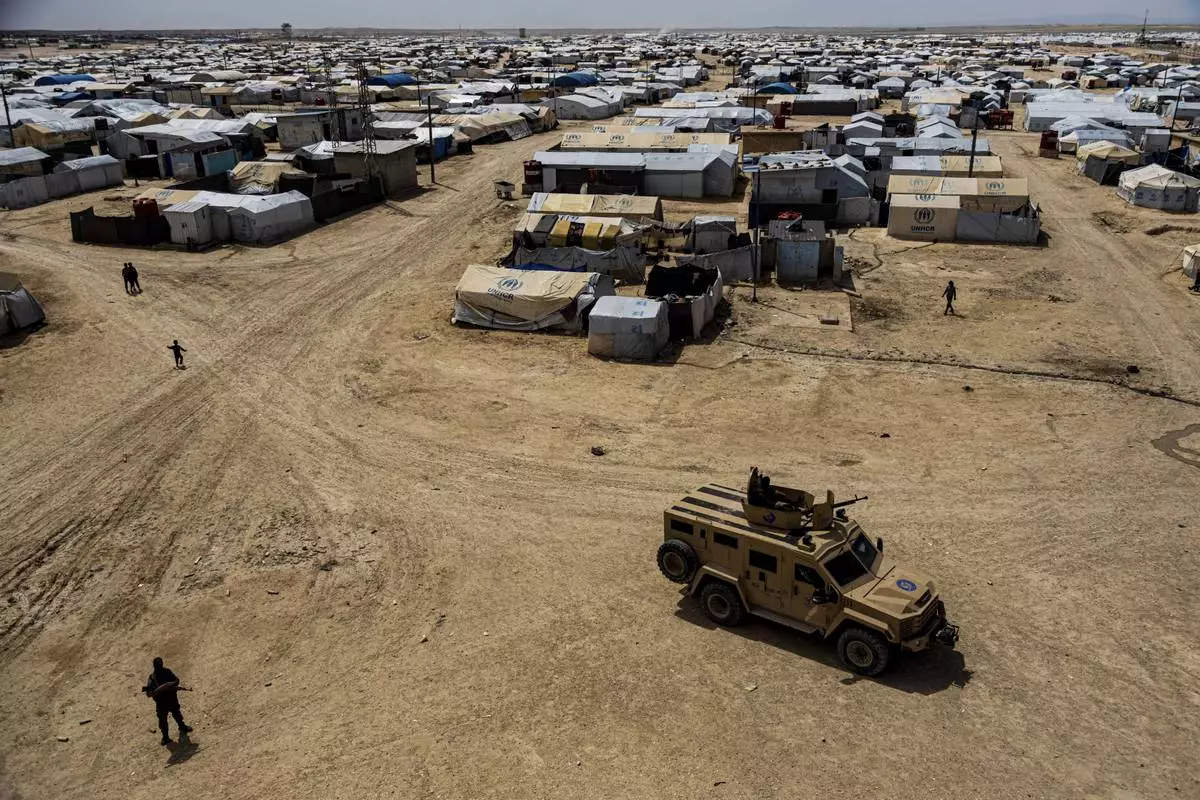
FILE - Kurdish forces patrol al-Hol camp, which houses families of members of the Islamic State group in Hasakeh province, Syria, on April 19, 2023. Amnesty International said Wednesday, April 17, 2024 it has documented widespread abuses, including torture and deprivation of medical care, in detention facilities holding thousands of suspected Islamic State members and their relatives in northeast Syria. (AP Photo/Baderkhan Ahmad, File)
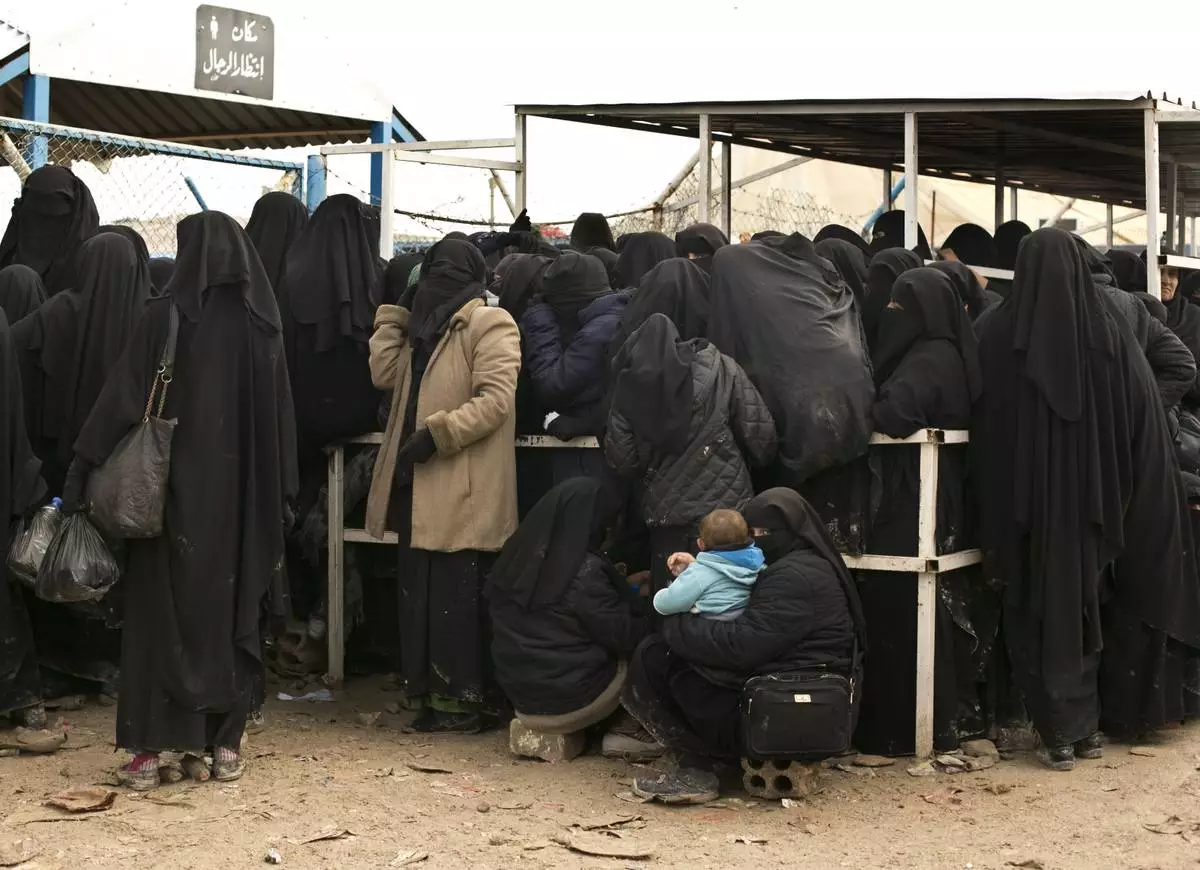
FILE - Women residents from former Islamic State-held areas in Syria line up for aid supplies at Al-Hol camp in Hassakeh province, Syria, March 31, 2019. Amnesty International said Wednesday, April 17, 2024 it has documented widespread abuses, including torture and deprivation of medical care, in detention facilities holding thousands of suspected Islamic State members and their relatives in northeast Syria. (AP Photo/Maya Alleruzzo, File)









